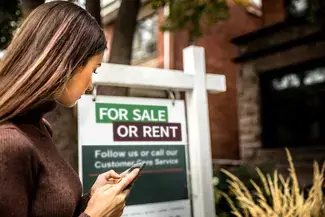Are You Ready to Buy a Home?

Your lease is coming to an end. What’s next? Have you been curious about buying? When it comes to renting versus buying, every case is different. We’re here to help clear some things up. Ask yourself questions, evaluate your current situation, and learn if homeownership is the right next step for you.
5 questions to ask yourself if you're considering buying a home:
- Do I have a steady, reliable income?
- How much total debt do I have (credit cards, car loans, student loans, etc.)? Is it manageable?
- Can I afford to pay a mortgage and other home expenses, such as insurance, property taxes, and repairs, in addition to my current monthly expenses? Use our Rent or Buy calculator tool.
- Do I have money saved for a down payment and closing costs? See Saving for a Down Payment.
- Do I want the responsibilities that go with being a homeowner? Watch What to Know When Buying a Home.
If you answered “yes” to these questions, buying a home might be the right path for you. But the answer isn’t always that simple. Let’s explore the pros and cons of owning a home.
Pros of owning a home
- A place of your own — There’s no better feeling than painting a wall or making a home improvement, knowing a landlord isn’t going to make you change it at the end of your lease. Maybe you're ready to settle down in your community, make room for a growing family, or just give your pup the backyard it deserves.
- Investment — You’ve heard this time and time again. When you rent a home or apartment, the money you pay as rent is an expense. On the other hand, owning a home is an investment that usually grows in value. As you make mortgage payments and the value of your property increases, your ownership (equity) increases.
- Housing costs — While rents typically increase year after year, the principal and interest portion of fixed-rate mortgage payments remain unchanged for the entire repayment period. As your income increases, your payments become more affordable.
- Tax benefits — Rent is generally not tax-deductible, but mortgage interest (including purchase points) on your primary residence may be. Homeowners usually are eligible for tax advantages not available to renters. Check with your tax advisor.
Potential cons of owning a home
- Higher costs — You can expect to pay more for housing as a homeowner than as a renter. Even if your mortgage payments are less than your rental payments, homeowners must also pay property taxes, homeowner’s insurance, utilities, and upkeep expenses.>
- Repairs and maintenance — When you own a home, the issues a landlord previously took care of are on your shoulders. From minor repairs to mowing and maintaining a lawn, get ready to get your hands dirty. Plus, when it's time to call professionals for major repairs or tune-ups, you're responsible for the bill.
- Potential loss — If you fail to make payments, the lender may sell the mortgaged property. This may result in the loss of your home and damage to your credit rating. That's why it's so important to make sure you're ready to buy a home.
Buying a home can seem intimidating, especially for a first-time homebuyer. Don't fret. You don't have to go through the homebuying process alone. We have experts ready to help! Check out our variety of resources, including homebuyer counseling through our learning partner, GreenPath Financial Wellness.
If you decide that homebuying is on your path to financial success, we can help you reach your goal.
Home sweet savings. For a limited time, get $500 toward closing when you finance with us.1